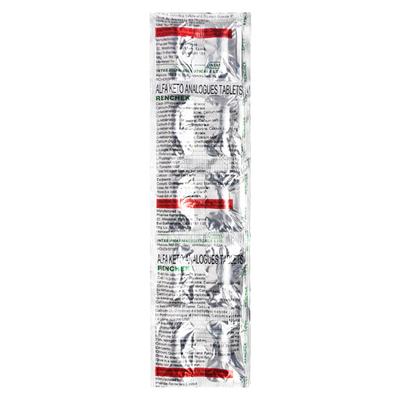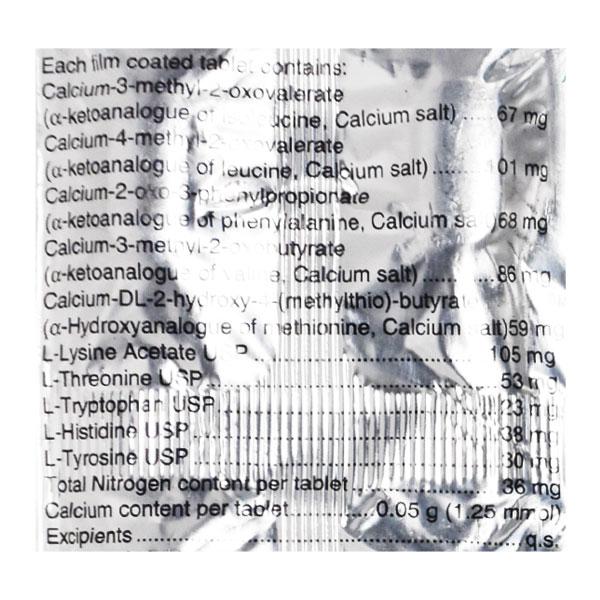

Netmeds First Membership
Quick Links
Introduction About RENCHEK TABLET
RENCHEK TABLET is combination of Alpha Ketoanalogue, L-Histidine, L-Lysine, L-Threonine, L-Tryptophan, and L-Tyrosine which belongs to the group of medicines called Amino acids. It is used to manage & manage kidney damage in chronic kidney diseases with protein restricted diet.
Chronic kidney diseases are long-standing conditions that lead to impairment of kidney functions, resulting in impaired excretion of toxins from the body. It is characterised by symptoms such as nausea, vomiting, loss of appetite, fatigue, weakness, and sleep problems.
RENCHEK TABLET is not recommended for use if you are allergic to alpha ketoanalogues, L-Histidine, L-Lysine, L-Threonine, L-Tryptophan, and L-Tyrosine. It is also not recommended for use in patients with hypercalcaemia (high blood calcium levels) or disturbed amino acid metabolism.
RENCHEK TABLET should be used with caution in patients with liver diseases, liver impairment, kidney diseases, and kidney failure. RENCHEK TABLET should be used with caution in pregnant and breastfeeding women. RENCHEK TABLET should be used with caution in children (aged 12 years or below) and elderly patients (above the age of 60 years).
The common side effects associated with the use of RENCHEK TABLET are signs of increased levels of alanine, glutamine, and glutamate (anxiety and restlessness) and signs of decreased levels of glycine and BCAA (impaired growth and protein wasting). Contact your doctor or a nearby hospital if any of the conditions worsen.
Uses Of RENCHEK TABLET
- Prevent & manage kidney damage in chronic kidney diseases with protein restricted diet
How RENCHEK TABLET Works
RENCHEK TABLET helps in managing chronic kidney diseases where Alpha Ketoanalogue, L Histidine, L Lysine, L Threonine, L Tryptophan, and L Tyrosine, after getting absorbed, get converted into corresponding essential amino acids by taking nitrogen from non-essential amino acids, thereby decreasing the formation of excessive urea and toxins in the body. These amino acids also have a positive effect on bone health by optimising the phosphate and parathyroid hormone levels in the body.
How to use RENCHEK TABLET
Take RENCHEK TABLET as advised by your physician. Swallow the medicine with a glass of water. Do not crush or chew the medicine. Your doctor will decide the correct dose and duration for you depending upon your age, body weight and disease condition.
Side Effects Of RENCHEK TABLET
Common
- signs of increased levels of certain amino acids (including alanine, glutamine, and glutamate) such as anxiety and restlessness
- signs of decreased levels of certain amino acids (glycine, valine, leucine, and isoleucine) such as impaired growth and protein wasting
Warning & Precautions
Pregnancy
Use with CautionRENCHEK TABLET should be used with caution in pregnant women. Consult and inform your doctor before taking it.
Breastfeeding
Use with CautionRENCHEK TABLET should be used with caution in breastfeeding women. Consult your doctor before taking it.
Driving and Using Machines
Use with CautionDo not drive or operate any machines while taking RENCHEK TABLET or engage in these activities that require complete mental alertness and motor coordination with caution.
Kidney
Use with CautionRENCHEK TABLET should be used with caution in patients with kidney diseases or renal failure. Consult your doctor for advice before taking it.
Liver
Use with CautionRENCHEK TABLET should be used with caution in patients with liver diseases or liver impairment. Consult your doctor before taking it.
Allergy
ContraindicatedRENCHEK TABLET is not recommended for use if you are allergic to Alpha Ketoanalogue, L Histidine, L Lysine, L Threonine, L Tryptophan, L Tyrosine, or any other ingredient of this medicine. Consult your doctor before taking it.
Use In Pediatrics
Use with CautionRENCHEK TABLET should be used with caution in in children (aged 12 years or below). Consult your doctor before taking it.
Use In Geriatrics
Use with CautionRENCHEK TABLET should be used with caution in elderly patients (above aged 60 years). Consult your doctor before taking it.
Others
RENCHEK TABLET is not recommended for use if you:
- have hypercalcaemia (high blood calcium levels)
- have disturbed amino acid metabolism
Before taking RENCHEK TABLET, inform your doctor if you:
- have hereditary phenylketonuria (inherent disorders causing phenylalanine build-up in the body)
Interactions
A. Drug-Drug Interactions:
Before taking RENCHEK TABLET, inform your doctor, if you are taking any of the following medicine:
- medicines used to manage bacterial infection such as tetracyclines (Ex. doxycycline), quinolines (Ex. ciprofloxacin, norfloxacin)
- medicines containing calcium, iron, fluoride, estramustine
- medicines used to manage arrythmias such as cardioactive glycosides Ex. digoxin
- aluminium hydroxide (medicine used to manage acidity)
Overdosage:
If you or anyone else accidentally takes too much of RENCHEK TABLET, consult your doctor immediately or visit the nearby hospital. In such situations, general symptomatic and supportive management is given.
Synopsis
| Drug | : | Alpha Ketoanalogue, L-Histidine, L-Lysine, L-Threonine, L-Tryptophan, and L-Tyrosine |
| Pharmacological Category | : | Amino acids |
| Therapeutic Indication | : | Chronic kidney diseases |
| Dosage Forms | : | Tablet |
More Information
- Keep the medicine out of reach of children
- Store RENCHEK TABLET at room temperature
FAQs About RENCHEK TABLET
Q: What is RENCHEK TABLET used for?
A: RENCHEK TABLET is used to manage kidney damage in chronic kidney diseases (long-standing conditions that lead to impairment of kidney functions) with a protein-restricted diet. Consult your doctor before taking it.
Q: What happens if you take more RENCHEK TABLET than your required dose?
A: If you or anyone else accidentally takes too much RENCHEK TABLET, consult your doctor immediately or visit the nearby hospital. In such situations, general symptomatic and supportive management is given.
Q: What side effects are seen with RENCHEK TABLET?
A: The common side effects associated with the use of RENCHEK TABLET are signs of increased levels of alanine, glutamine, and glutamate (anxiety and restlessness) and signs of decreased levels of glycine and BCAA (impaired growth and protein wasting). Contact your doctor or a nearby hospital if any of the conditions worsen.
Q: Who should avoid taking RENCHEK TABLET?
A: RENCHEK TABLET is not recommended for use if you are allergic to alpha ketoanalogues, L-histidine, L Lysine, L Threonine, L Tryptophan, and L-tyrosine. It is also not recommended for use in patients with hypercalcaemia (high blood calcium levels) or disturbed amino acid metabolism. Consult your doctor before taking it.
Q: Is RENCHEK TABLET safe to use in children or elderly patients?
A: RENCHEK TABLET should be used with caution in children (aged 12 years or above) and elderly patients (above 60 years). Consult your doctor before taking it to avoid any harm.
Q: How does RENCHEK TABLET work?
A: RENCHEK TABLET helps in managing chronic kidney diseases where Alpha Ketoanalogue, L Histidine, L Lysine, L Threonine, L Tryptophan, and L Tyrosine, after getting absorbed, get converted into corresponding essential amino acids by taking nitrogen from non-essential amino acids, thereby decreasing the formation of excessive urea and toxins in the body. These amino acids also have a positive effect on bone health by optimising the phosphate and parathyroid hormone levels in the body.
Q: What is the method of taking RENCHEK TABLET?
A: Take RENCHEK TABLET as advised by your physician. Swallow the medicine with a glass of water. Do not crush or chew the medicine. Your doctor will determine the correct dose and duration for you depending upon your age, body weight, and disease condition.
Q: Is RENCHEK TABLET safe to use in kidney patients?
A: RENCHEK TABLET should be used with caution in patients with kidney diseases or renal failure (complete or partial loss of kidney functions). Consult your doctor for advice before taking it.
Q: Is RENCHEK TABLET safe to use in liver patients?
A: RENCHEK TABLET should be used with caution in patients with liver diseases or liver impairment (partial or complete loss of liver functions). Consult your doctor before taking it.
Q: Is RENCHEK TABLET safe for pregnant women to use?
A: RENCHEK TABLET should be used with caution in pregnant women as there are insufficient human and animal studies to establish the safety and efficacy of this medicine in this population. Consult and inform your doctor before taking it.
References
1. Bharat V Shah. Nutritional Requirements in Health. Kidney Disease and Nutrition. 2013. Page - 2.
2. Milan HOLECEK. Side Effects of Amino Acid Supplements. NIH National Library of Medicine. National Centre for Biotechnology Information. PMC PubMed Central. January 2022. [Assessed on 1st September 2022] https://www.ncbi.nlm.nih.gov/pmc/articles/PMC8997670/
3. Subcommittee on the Tenth Edition of the RDAs, Food and Nutrition Board, Commission on Life Sciences, National Research Council, Protein and Amino Acids; Recommended Dietary Allowances: 10th Edition. NIH National Library of Medicine. National Centre for Biotechnology Information. Bookshelf. 1989. [Assessed on 1st September 2022] https://www.ncbi.nlm.nih.gov/books/NBK234922/
4. Serena del Favero, Hamilton Roschel, Marina Y. Solis, Ana P. Hayashi, Guilherme G. Artioli,1 Maria Concepción Otaduy, Fabiana B. Benatti, Roger C. Harris, John A. Wise,4 Cláudia C. Leite, Rosa M. Pereira, Ana L. de Sá-Pinto, Antonio Herbert Lancha-Junior, Bruno Gualano. Beta-alanine (Carnosyn™) supplementation in elderly subjects (60–80 years): effects on muscle carnosine content and physical capacity. NIH National Library of Medicine. National Centre for Biotechnology Information. PMC PubMed Central. December 2011. [Assessed on 1st September 2022] https://www.ncbi.nlm.nih.gov/pmc/articles/PMC3374124/
5. Centaur Pharma. Nefrogard Tablet. [Revised in January 2021] [Assessed on 1st September 2022] https://www.centaurpharma.com/downloads/2021/nephrology/NEFROGARD.pdf
Useful Diagnostic Tests
- Blood Tests








